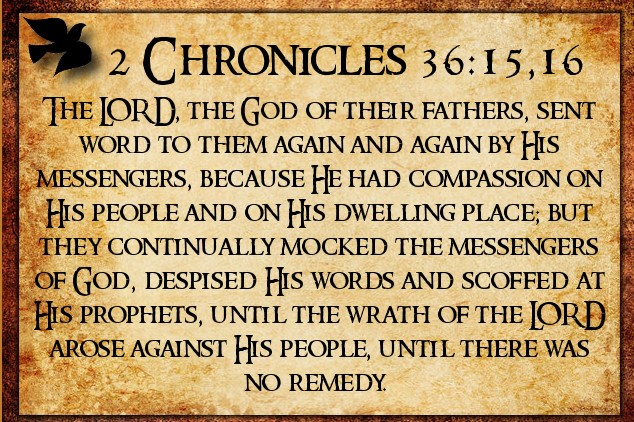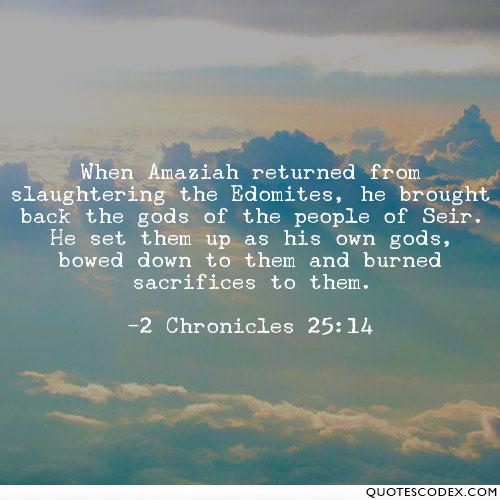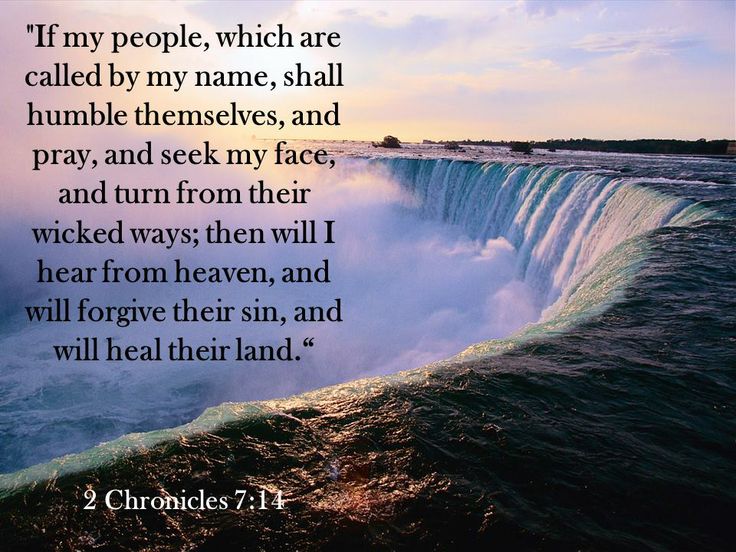II Chronicles 35-36

Sunday, December 4
Have you ever wondered if God gets frustrated when people don’t listen to Him? The people of Jerusalem had a great king while Josiah was ruler of Jerusalem but things quickly turned sour after his death. Under King Josiah the people had experienced the re-instatement of the religious commemoration festivities of Passover. The celebration was even mostly funded with animal sacrifices given by Josiah and his officers on behalf of the laypeople. We are told that such a tremendous Passover had not been celebrated like that in Israel since the days of Samuel the prophet, and that no other Passover celebration was quite like the one that Josiah had with the Priests of God. But then something tragic happens. Josiah, who normally would have listened to God, and his messengers decides to not heed God’s warning and goes to war unnecessarily where he is wounded and dies.
This is where the story of the people of Jerusalem takes a dramatic, terrible turn for the worse. Under their next two kings who are ungodly men the country goes into a spiritual downward spiral. The people forget the goodness of God, their devotion to Him and refused to listen to the prophets such as Jeremiah that God would send to warn the people to turn from their wicked ways. Again, and again they were warned but they continually mocked the messengers of God, thus raising the wrath of God until there was no remedy. The people and their kings did not listen, so God allowed King Nebuchadnezzar of Babylon to overtake their beloved city and carry many of the people off into exile in the land of Babylon. To make matters worse the Babylonians carried off the sacred vessels and treasures of God’s house to their own land, slew many of the people, burned the house of God, and tore down the protective wall around Jerusalem. The people stayed exiled in Babylon, and the city of Jerusalem lay in ruins for 70 years before God brought about a change by stirring up within Cyrus King of Persia’s spirit that the people that had been taken captive in the previous conquests should be allowed to go back to their homeland and worship in their beloved city once again.
What caught my eye in this passage is that the people would not listen and mocked the messengers of God and scoffed at the prophets God sent. Doesn’t that sound like the society we live in today?
Many of us have friends who are unbelievers, or even friends who claim to be Christians but their life choices and their actions don’t seem to follow God’s standards. Many of them are doing the same thing today by scoffing at the idea that there is a God who is in control of the Universe or mocking God by not following his standards instead choosing to do whatever makes them feel good. People often make excuses why they are the exception to God’s rules. Does God like this? From what we have read, God doesn’t. Scripture reminds us that we should not be deceived, God will not be mocked, people reap what they sow. By sowing disobedience to God, in turn God removed his protection from the people of Jerusalem and allowed them to be overtaken by enemies.
Every action has a consequence, every choice has a consequence. Choosing not to listen to God, and honor him has its consequences as well. The people of Jerusalem found that out the hard way. If only they had just listened to God how differently things might have turned out! Key thought: Choose to hear when God is speaking to you!
-Merry Peterson
A Little About The Writer:
Merry Peterson is an Associate Pastor at Freedom In Christ Church in Welland, Ontario, Canada. She grew up in Canada and recently moved back there after pastoring a church in Wenatchee, Washington for 15 years. She is a graduate of Atlanta Bible College, and Clayton State University. She enjoys hiking, baking, reading, and often has pet goldfish. Merry has enjoyed being at FUEL as a camper and as part of the staff.









